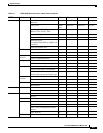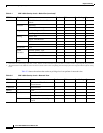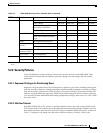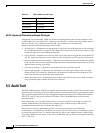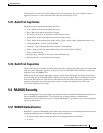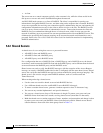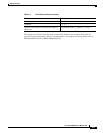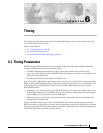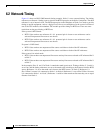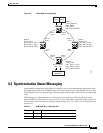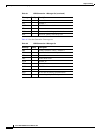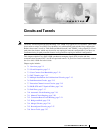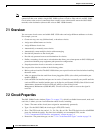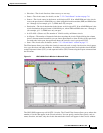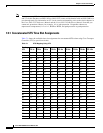
CHAPTER
6-1
Cisco ONS 15600 Reference Manual, R7.2
6
Timing
This chapter provides information about Cisco ONS 15600 timing. To provision timing, refer to the
Cisco ONS 15600 Procedure Guide.
Chapter topics include:
•
6.1 Timing Parameters, page 6-1
•
6.2 Network Timing, page 6-2
•
6.3 Synchronization Status Messaging, page 6-3
6.1 Timing Parameters
SONET timing parameters must be set for each ONS 15600 node. Each ONS 15600 independently
accepts its timing reference from one of three sources:
•
The BITS (building integrated timing supply) pins on the Customer Access Panel (CAP).
•
A port on an OC-N card installed in the ONS 15600. The timing is traceable to a node that receives
timing through a BITS source.
•
The internal Stratum 3E clock (ST3E) on the TSC card.
You can set ONS 15600 timing to one of three modes: external, line or mixed. If the timing comes from
BITS, set ONS 15600 timing to external. If the timing comes from an OC-N port, set the timing to line.
If the timing comes from both BITS and OC-N port, set ONS 15600 timing to mixed. In typical
ONS 15600 networks:
•
One node is set to external timing. The external node derives its timing from a BITS source wired
to the BITS backplane pins. The BITS source, in turn, derives its timing from a Primary Reference
Source (PRS), such as a Stratum 1 clock or GPS signal.
•
Other nodes are set to line timing. The line nodes derive timing from the externally timed node
through the OC-N trunk cards.
You can set three timing references for each ONS 15600. The first two references are typically two
BITS-level sources, or two line-level sources optically traceable to a node with a BITS source. The third
reference is the internal ST3E clock provided on every ONS 15600 TSC card. If an ONS 15600 becomes
isolated, the TSC maintains timing at the ST3E level.



